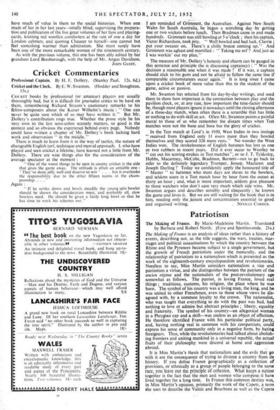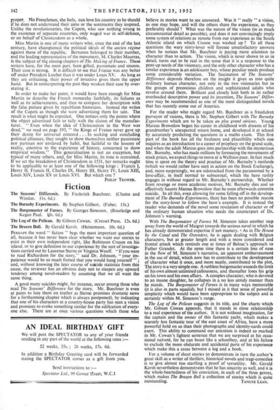Patriotism
The Making of France is an analysis of ideas rather than a history of events, describing not, as the title suggests, the wars, treaties, mar- riages and political assassinations by which the country between the Rhine and the Pyrenees became subject to a single government, but the growth of French patriotism under the monarchy, and the relationship of patriotism to a nationalism which is presented as the work of the eighteenth-century encyclopaedists and revolutionaries. Needless to say, Miss Martin considers nationalism a vice and patriotism a virtue, and she distinguishes between the patriots of the ancien regime and the nationalists of the post-revolutionary age somewhat as follows. The patriot, in loving France, loved real things ' • traditions, customs, his religion, the place where he was born. The symbol of his country was a living man, the king, and he was united to other Frenchmen, even to those whose views he dis- agreed with, by a common loyalty to the crown. The nationalist, who was taught that everything to do with the past was bad, had nothing to love or admire but abstract principles ; liberty, equality and fraternity. The symbol of his country—an allegorical woman in a Phrygian cap and a shift—was useless as an object of affection. He therefore identified France with his particular political party, and, having nothing real in common with his compatriots, could express his sense of community only in a- negative form, by hating foreigners. Thus, while the revolutionaries had talked about abolish- ing frontiers and uniting mankind in a universal republic, the actual fruits of their philosophy_ were discord at home and aggression abroad.
It is Miss Martin's thesis that nationalism and the evils that go with it are the consequence of trying to divorce a country from its history. If you define France geographically as a collection of provinces,. or ethnically as a group of people belonging to the same race, you leave out the principle of cohesion. What keeps a nation"
together is the fact that the men and women who compose- it have lived together for a long time. In France this common destiny was, in Miss Martin's opinion, primarily the work of the Capets, a term she uses to describe the Valois and Bourbons as well as the Capets proper. No Frenchman, she feels, can love his country as he should if he does not understand their aims or the sentiments they inspired. Unlike the revolutionaries, the Capets, who saw nothing wrong in the existence of separate countries, only waged war in self-defence, or on behalf of Christendom as a whole.
Miss Martin is one of many writers who; since the end of the last. century, have championed the political ideals of the ancien rigime against those of the republic. Bernanos belonged to their number, and the leading representative of the movement, M. Charles Maurras, is the subject of thg closing chapters of The Making of France. These writers have, for the most part, been gifted, passionate and sincere. Their case is strong. It is difficult to see that France was any better off under President Loubet than it was under Louis XV. As long as they are criticising, their power of invective gives them the upper hand. But in reinterpreting the past they weaken their case by over- stating it.
In order to make her point, it would have been enough for Miss Martin to describe the French monarchy faithfully, its failures as well as its achievements, and then to compare her description with the false picture given by republican historians. Instead she writes of the Capets as though she were advertising them for sale. The result is what might be expected. One notices only the points where the object advertised fails to tally with the claims of the manufac- turer. " Even when the idea of Christendom in the West was dead," we read on page 193, " the Kings of France never gave up their desire for universal concord . . . In seeking and concluding political alliances, they sought to show themselves neither passionate nor partisan nor enslaved by habit, but faithful to the lessons of reality, attentive to the experience of history, concerned to show empirical wisdom." This generalisation is not an exception, but typical of many others, and, for Miss Martin, its tone is restrained. If we set the breakdown of Christendom in 1531, her remarks ought to be applicable to at least one of the following kings : Francis I, Henry II, Francis II, Charles IX, Henry III, Henry IV, Louis XIII, Louis XIV, Louis XV or Louis XVI. But which one ?
PHILIP TROWER.



































 Previous page
Previous page